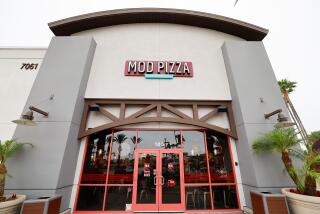Domino’s Founder to Retire, Sell Stake
- Share via
DETROIT — Domino’s Pizza founder Tom Monaghan said Friday that he is retiring and selling a controlling stake of the entire company to a Massachusetts investment firm so that he can devote his time to charity.
Bain Capital Inc. will pay about $1 billion, people familiar with the purchase told Bloomberg News. Monaghan said he will retain some equity in the company he founded in 1960 and built into the world’s second-largest pizza chain.
“At the age of 61, reflecting on my life and the goals I have yet to fulfill, I have decided to retire from active involvement in Domino’s Pizza and devote more time to my charitable endeavors,” Monaghan said in a statement.
Domino’s is second to Pizza Hut in the United States. It has about 6,100 stores, 4,400 of them in the U.S.
Closely held Ann Arbor, Mich.-based Domino’s, which was advised in the transaction by J.P. Morgan Securities, had 1997 sales of $3.2 billion, up from $2.8 billion in 1996. The agreement signed Friday was expected to be completed within a few months.
“Pizza is a thriving business,” said Mitchell Speiser, a Lehman Bros. analyst. The sale “could be a precursor to some kind of [public] offering.”
Monaghan, who owned more than 90% of Domino’s, is selling nearly his entire stake to Bain, which manages more than $4 billion. One of Bain’s managing directors is Mitt Romney, the son of former Michigan Gov. George Romney.
Kyle Potvin, a spokeswoman for Bain Capital, said the firm will run the company and Monaghan will not be involved in day-to-day operations. Monaghan will step down as chief executive but will remain on the board of directors, Domino’s spokesman Tim McIntyre said.
The company was founded when Monaghan and his brother James borrowed $900 to buy DomiNick’s, a pizza store in Ypsilanti, Mich. James later traded his share of the business for a Volkswagen Beetle. Monaghan renamed the store Domino’s Pizza in 1965 and opened the first franchise in 1967.
Monaghan has made several attempts to sell parts of the business over the years and had asked $1 billion for it in the early 1990s.
More to Read
Inside the business of entertainment
The Wide Shot brings you news, analysis and insights on everything from streaming wars to production — and what it all means for the future.
You may occasionally receive promotional content from the Los Angeles Times.










